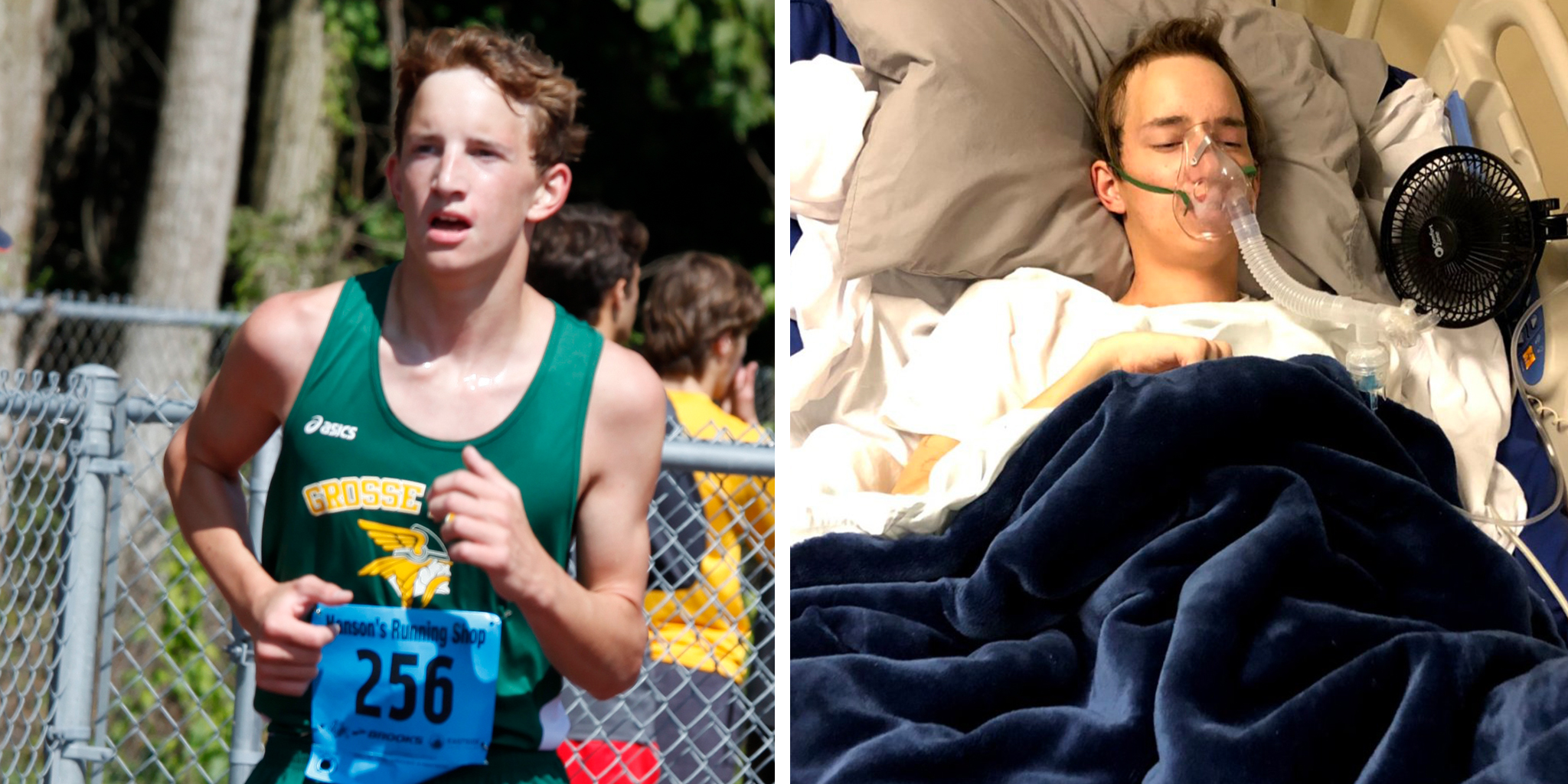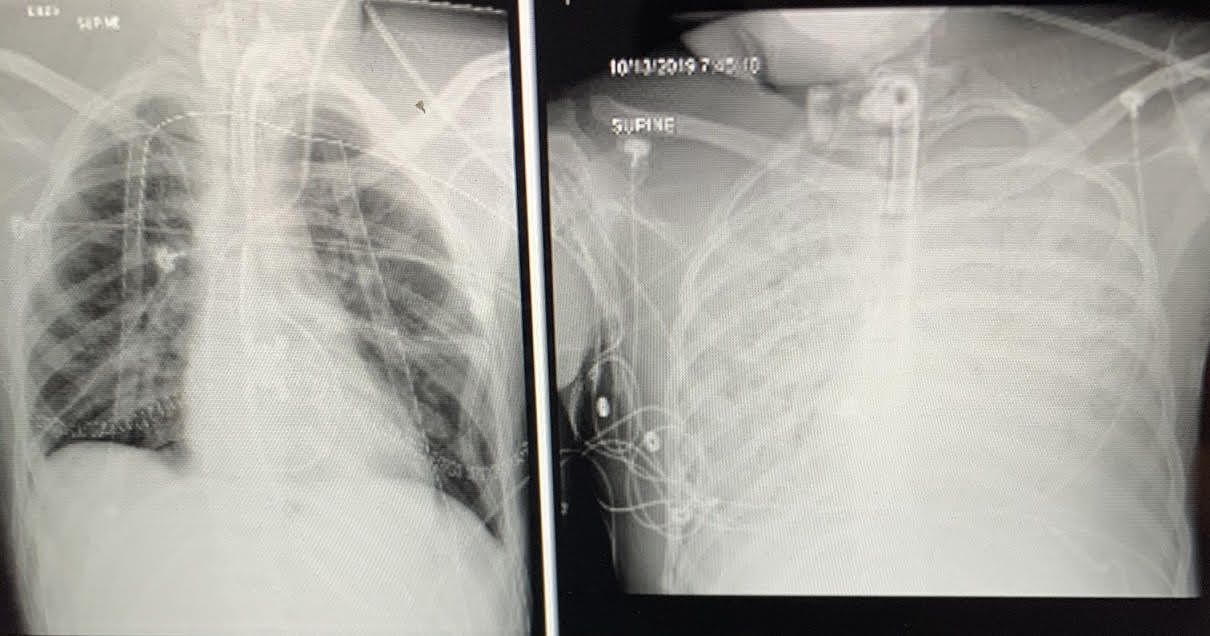
Daniel Ament went to sleep one day and woke up months later with a new set of lungs.
Ament, 17 and a high school junior in Grosse Pointe, Mich., (anonymously) made headlines this past fall after becoming the first person to receive a double lung transplant due to what doctors attribute to vaping-related damage. But Ament—who spent more than a month critically ill and hospitalized before his surgery—doesn’t remember any of it.
“I was trying to think of the last thing I could remember, and it was summer,” says Ament, talking on the record for the first time. [When I woke up,] it was almost snowing outside.”
Ament hadn’t meant to pick up a vaping habit. He was a devoted runner and sailor, and for years, he says, he didn’t want to do anything that could jeopardize his athletic performance. But after a knee injury sidelined him from running, his resolve started to slip. Starting around the winter of 2018, his sophomore year, Ament would hit friends’ vapes at parties or while driving around; it didn’t really matter who it belonged to or what brand it was. It was easy to do, at a time when the federal government estimates about a fifth of high school students were using e-cigarettes—a number Ament says is an underestimate, at least in his world.
“It would be more rare to find someone who doesn’t vape,” he says. “Everyone was doing it and nothing bad was happening.”
Still, it wasn’t until this past summer, when a friend left a Juul e-cigarette in his car, that Ament started vaping every day—usually nicotine via his Juul, but sometimes products containing THC, the marijuana compound, too. “My plan was to vape for the rest of the summer and then I would stop at school,” he remembers.
He followed through on that plan, but on his second day back at school this past September, he woke up feeling awful, with a headache, back pain, fatigue and a high temperature. He went to school anyway, not wanting to fall behind so early in the semester. But when he felt just as bad the next day, he went to his pediatrician’s office.
His doctor, who did not know about Ament’s vaping habit, thought the teenager either had pneumonia, or an infection from a sailing-related cut on his arm. Ament went home. But soon after, he began to have difficulty breathing and started to fear his illness was serious.
He went to the emergency room at Detroit’s St. John Hospital for further evaluation, and decided to tell the truth about his vaping habit. He’d heard about a nationwide outbreak of vaping-related lung illnesses—which has, as of latest count, sickened about 2,700 people and killed 60—and began to wonder if his case might be related. “If it was vaping, they needed to know,” he says.
Doctors took a chest x-ray but didn’t see much out of the ordinary; they thought, at first, he might have pneumonia. Ament’s breathing problems persisted, so St. John admitted him on Sept. 5—and that, he says, is about where his memory drops off. As Ament drifted in and out of consciousness, his condition worsened. Doctors at St. John intubated him on Sept. 12, and five days later transferred him to Children’s Hospital of Michigan for more intensive care. There, he was hooked up to an ECMO machine, which oxygenates the body’s blood and organs so the lungs can rest. But Ament kept getting worse, and it quickly became clear that a double lung transplant was the only way to keep him alive. That’s when Dr. Hassan Nemeh, a thoracic surgeon at Detroit’s Henry Ford Hospital, got involved.

“His case, to the best of my ability to remember, is the worst [lung damage] that I’ve seen,” Nemeh says. “We were against a wall. We had to transplant him or pull support. I truly don’t think he had a lot of time left.”
The severity of Ament’s case was a mixed blessing. Patients in immediate need of a lifesaving organ transplant are moved up the waiting list, potentially allowing doctors to accept matches from other states or regions if it means a donor comes through in time. After Ament was listed on Oct. 8, he moved to the top of the list almost immediately. While double lung transplants are fairly rare, especially for a teenager—only 37 were performed on 11- to 17-year-old Americans in 2019, according to federal data—Nemeh and his team were able to find a deceased donor who was a match for Ament about a week later. They performed a double lung transplant on Oct. 15.
When the surgeons removed Ament’s lungs, Nemeh remembers, “they were so scarred they didn’t even deflate. It was definitely a different kind of damage than we usually see. This lung was literally solid, as if it was made out of truck-tire rubber.”
Nemeh isn’t entirely sure what could have caused that unusual damage, but says he is confident it had to do with Ament’s vaping habit. Most people who have reported vaping-related lung injuries got sick after using products containing THC, and the U.S. Centers for Disease Control and Prevention has found a strong connection between illnesses and the oily additive vitamin E acetate, which is used to dilute THC content in vaping oils.
When Ament finally came to after surgery, his muscles were so weak from months in a hospital bed that he couldn’t talk and could hardly breathe; he wasn’t taken off a ventilator until Oct. 27. “I was kind of freaking out when I woke up,” Ament says. “I kept having nightmares and hallucinating. I don’t think I processed it at first.”
Even months later, Ament says he’s still processing what happened. “I still have moments where I’ll kind of have a reality check,” he says. “I think about it a lot.”
He also thinks a lot about something he and Nemeh discussed after the surgery: the need to do good. “I talked to him quite a bit to give him pep talks and try to build up his spirit and give him hope for the future,” Nemeh says. “He has a unique chance to make a huge difference, because his word is very credible to many kids. They can see him as a living example.”
Ament is using that platform to try to dissuade his peers—including his own friends and brother, who still vape—from using e-cigarettes. He’s working on founding a nonprofit called Fight4Wellness that he hopes will enable him to tell his story more widely, through speaking at schools and developing toolkits that educators can use to help kids quit the habit. Ament isn’t back in school yet, but hopes to be soon; he still aspires to graduate high school and go to college, though his health problems and long recovery have put his old dream of attending the U.S. Naval Academy further from reach.
Ament says he wants other teenagers to know they’re “not invincible. Any plans they have for the future, any sports they play, anything they’re really passionate about, it’ll all be way harder to do if this happens to them. What’s the point of getting that small buzz [from vaping]?”
He’s especially committed to spreading that message, because he wants to thank his organ donor’s family for making his second chance possible. “It’s not going to be in vain,” Ament says. “I’m going to take good care of my body and use [these lungs] well.”
More Must-Reads from TIME
- Cybersecurity Experts Are Sounding the Alarm on DOGE
- Meet the 2025 Women of the Year
- The Harsh Truth About Disability Inclusion
- Why Do More Young Adults Have Cancer?
- Colman Domingo Leads With Radical Love
- How to Get Better at Doing Things Alone
- Michelle Zauner Stares Down the Darkness
Write to Jamie Ducharme at jamie.ducharme@time.com